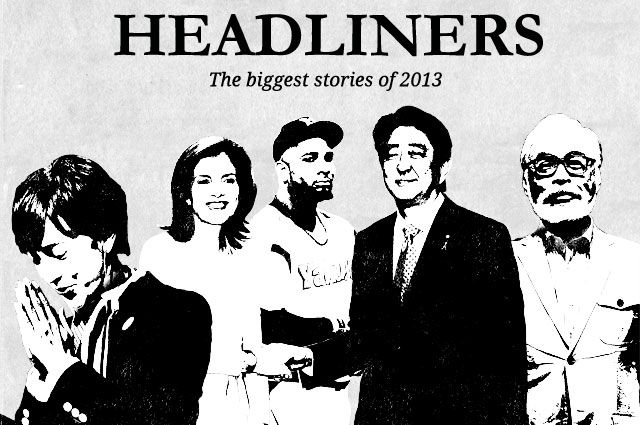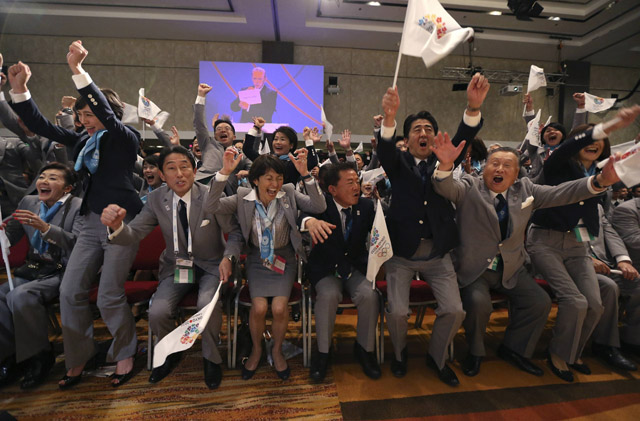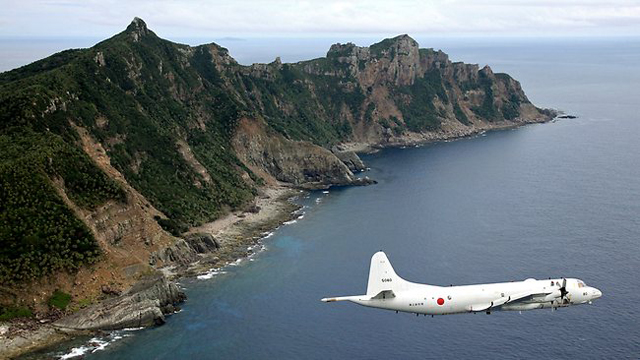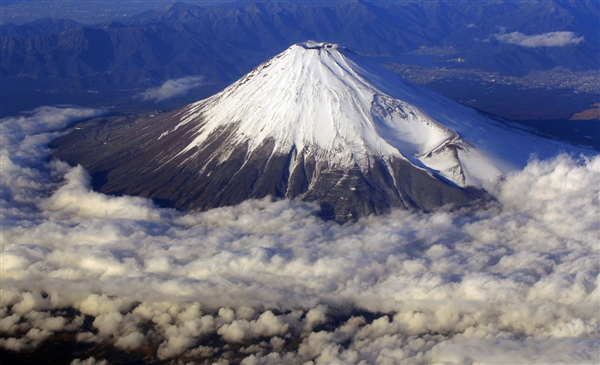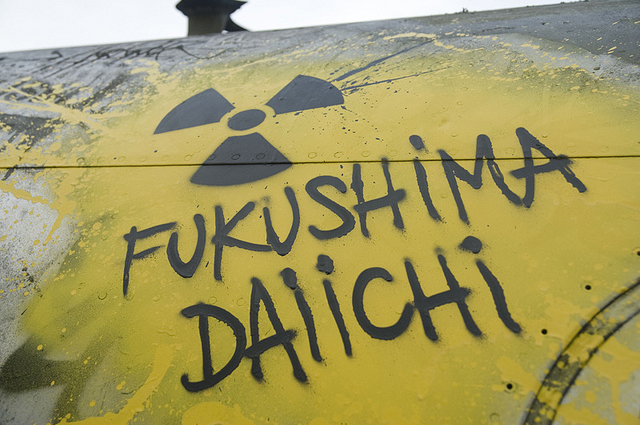A successful bid for the 2020 Olympics, world culture accolades, and some troubling developments at home and abroad are among the Weekender’s choices for the major stories of 2013.
Tokyo 2020
After the jubilation comes the hard work of getting ready for the Games. Tokyo’s greatest strengths in its bid were a strong economy and a solid infrastructure, and while recent protests have put a limit on the size of the central Olympic stadium, you can count on Tokyo to make sure that the trains will run on time and the 2020 Games will be a well-organized affair. Recent decisions by the Ministry of Education to start English education at the third grade and to require English teachers to do some studying abroad are an indication that the government is interested in developing Japan’s overall capacity for cosmopolitanism as well.
A Kennedy Comes to Town
Caroline Kennedy arrived in Tokyo just three days before the 50th anniversary of her father’s assassination, and she will bring a high profile to the office of US Ambassador to Japan. Given the enthusiastic throng that met her before she boarded the horse-drawn carriage that took her to present her credentials to the Emperor, it is clear that the Kennedy Mystique still has its power, even in Japan. Ambassador Kennedy is also the first woman to hold the position, and is being looked at as a role model for Japanese women as well. However, her diplomatic skills will be quickly put to the test by international tensions that show no signs of relaxing.
The Neighbors Aren’t Getting Along
Bad relations between Japan, China, and South Korea over island sovereignty and wartime recriminations have been steadily brewing throughout the year. China has declared a restricted flight zone that includes the disputed Senkaku Islands, and Japanese and South Korean passenger planes are currently testing China’s resolve by flying through the zone. While Japan and South Korea can agree to defy China’s air-defense zone, they aren’t able to agree on much else. Conflicts over rights to the Takeshima Islands and each side’s “historical perceptions” have scuttled any current possibility of a summit between the nations. A mutual love of one another’s popular culture continues to be a bright spot in this turmoil.
The Abenomics Engine
Depreciation of the yen, consumption tax increases, and a heavy diet of infrastructure spending have given a long-sluggish Japanese economy a shot in the arm and sparked worldwide attention. In the short term, the stock market has jumped, an already low unemployment rate has dipped further, and there is a general feeling of confidence in the Japanese economy. However, longer term issues, including an ever-aging population and a massive public debt load, have not gone anywhere and still threaten to chip away at the successes of Prime Minister Abe’s economic turnaround.
Miyazaki Steps out of the Director’s Chair
The beloved filmmaker Hayao Miyazaki has delighted audiences in Japan and overseas for decades, and news of his exit from directing was met with disappointment. While not stepping away from the business entirely—the director has already begun work on an ambitious manga project—his decision will leave a considerable gap for the next generation of anime directors to fill.
Balentien Breaks the Home Run Record
Breaking a Nippon Professional Baseball record that stood for 49 years, Wladimir Balentien’s 60 home runs stands as a sports milestone among many achievements this year. Sadaharu Oh’s record of 55 home runs seemed unreachable, partially because the three batters who did recently approach it—all of whom were foreigners—found their path to the record blocked by pitchers all too ready to intentionally walk them. It was a good sign to see so much support for the Curaçaoan slugger coming from Japanese fans.
Governor Inose Steps Down
This was a disappointing story to see develop. We spoke with Governor Inose earlier this year, and he did seem to be a voice for reform and change in the city. He was also instrumental in the success of the Olympic bid. The electioneering scandal developed quickly, and the governor resigned less than a month after the story broke. A strong candidate for his replacement has yet to be chosen, and concerns have already been raised about preparations for Tokyo 2020.
Cultural Treasure Chest
In June, UNESCO formally added the iconic peak of Mt. Fuji to its list of World Heritage sites. This month washoku, or traditional Japanese cuisine, was listed as an Intangible Cultural Heritage, one of only a few food cultures that have been awarded this honor. But this recognition comes with its drawbacks. More people coming to visit the Mt. Fuji area will certainly bring increased revenues from tourism, but there are already worries that a rise in visitors will have a negative effect on the surrounding environment. And while developing news of food mislabeling throughout the country should not affect UNESCO’s washoku decision, it does add a whiff of irony to the affair.
Keeping Secrets
Japan’s Secrecy Act has drawn concern from the press and opposing politicians due to its vague language and harsh penalties for government members who reveal confidential information—and for journalists who attempt to obtain that information. Put forth at the same time as a bill that will create a Japanese National Security Council, the national secrets law is part of a larger set of policies that Abe hopes to use to strengthen Japan’s global security clout. Though these bills may help the nation stand more firmly on the world stage, the Secrecy Act’s overly general (and easily changeable) definition of what “confidential” means is a worrying step against freedom of the press.
The Stories to watch in 2014
Will Women Get Their Due?
PM Abe promoted gender equality as a pillar of his administration, and has just named Makiko Yamada as a prime ministerial aide—the first woman to hold such an office. A good step, but there is still some way to go—Japan ranked 105th out of 136 nations in the World Economic Forum’s recent Global Gender Gap Report.
Casinos in Japan
In a country that loves gambling as much as Japan does, the casino business seems like a sure bet. Lawmakers will be putting this bill forward at the beginning of the month, and Parliament will deliberate on it during the next year. We’d put our money on this bill’s success in 2014.
SoftBank and Rakuten CEOs Duke It Out
The second and third richest men in Japan—Masayoshi Son (SoftBank) and Hiroshi Mikitani (Rakuten), respectively—both have a reputation for aggressive business practices and direct talk. Yahoo! Japan’s (SoftBank is the largest shareholder) recent decision to eliminate vendor storefront fees is a blow to Rakuten, and it could be just the beginning of a battle between the two business titans.
The Elephant in the room
In truth, this could be one of the biggest stories of 2013, and was always brewing in the background. From Abe’s admission that international assistance was needed at Fukushima to the delicate fuel rod removal process that is currently under way, this has been—and will be—one of the most important stories to follow in the year to come: but you’ll have to read between the lines.
LINE App Keeps Growing
Last month the messaging service hit 300 million users, and it shows no signs of stopping. Born as a means for employees of an online game company to stay in touch with each other after the Tōhoku Earthquake, Line could eventually challenge Twitter in Japan if its boom continues.

